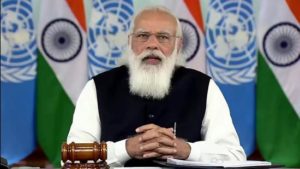
Indian Prime Minister Narendra Modi on Monday called for a ‘framework of mutual understanding and cooperation’ on maritime security based on five principles that include the settling of maritime disputes ‘peacefully and in accordance with international laws’, which is something that China has disregarded in furthering its claims in the South China Sea.
Freed maritime trade, jointly fighting maritime threats from natural disasters and non-state actors such as pirates, preservation of maritime environment and promoting ‘responsible maritime connectivity’ were the other four ‘basic principles’ proposed by the prime minister as chair of a high-level debate on maritime security: maintenance of international peace and security.
Modi became on Monday the first Indian prime minister to chair, although virtually, a high-level debate of the UN Security Council, using its month-long rotational presidency for August. The debate was attended by several heads of state and government such as Russia’s Vladimir Putin, Vietnam’s Pham Minh Chinh, and Democratic Republic of Congo’s Felix Antoine Tshisekedi Tshilombo, who is also president of the African Union, and US secretary of state Antony Blinken.
India hosted the maritime security debate as a signature event, with two more later in the month that will be focused on UN peacekeeping and counter-terrorism.
OCEANS: LIFELINE OF INTERNATIONAL TRADE
‘Oceans are our shared global commons, they are also the lifeline of international trade. Above all, they are key to our planet’s future,’ the prime minister said in Hindi as translated into English by an official interpreter.
‘However, today this common heritage of ours faces various types of threats. Maritime routes are being misused for piracy and terrorism. There are maritime disputes between countries. And climate change and natural disasters are also challenges to our maritime domain.’
In this context, Modi added, ‘We need a framework for mutual understanding and cooperation in order to conserve and utilise our shared maritime heritage. Such a framework cannot be created by any country alone. It requires a joint effort by all of us.’
Laying out the five ‘basic principles’, Prime Minister Modi recalled in details India’s own role in observing and promoting them, going back to the Harappan civilisation whose Lothal port had extensive maritime trade linkages to other contemporary civilisations and he underscored the freedom of these routes that allowed Buddha’s preachings to spread around the world. ‘Free maritime trade has always been part of the civilisational ethos of India,’ he said.
SETTLING MARITIME DISPUTES PEACEFULLY
On the principle of settling maritime disputes peacefully and in accordance with international law, the prime minister spoke, once again, India’s own efforts in this regard and cited the resolution of its own differences with Bangladesh. ‘This is extremely important for promoting mutual trust and confidence and ensuring global peace and stability.’
The prime minister did not mention China, which has shown itself to be most prolific violator of maritime laws in settling disputes and furthering claims, such as in the South China Sea.
Blinken, the US secretary of state, did not hold his punches though. He spoke forcefully on ongoing disputes and claims and counterclaims in the South China Sea, without naming China, which is at the heart of them all. ‘When a state faces no consequences for ignoring these rules, he said, referring to South China Sea actions without naming China, ‘it fuels greater impunity and instability everywhere’.
China’s deputy permanent representative Dai Bing pushed back later, says the Security Council was not the right forum for discussing South China Sea and attacked the United States as ‘unqualified to make irresponsible remarks on the’. ‘The United States has been stirring up trouble out of nothing.’
The need for action on maritime security was echoed, however, by all participants in the debate.
President Putin, who spoke after Modi, proposed ‘establishing a special structure within the UN system that would directly deal with the issue of fighting maritime crime in various regions’.
He added that the structure ‘should be based on the support of the UN member states, and actively engage experts, representatives of civil society, academia, and private sector’.




 Driving Naari Programme launched in Chandigarh
Driving Naari Programme launched in Chandigarh






























